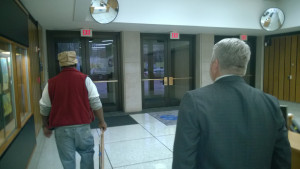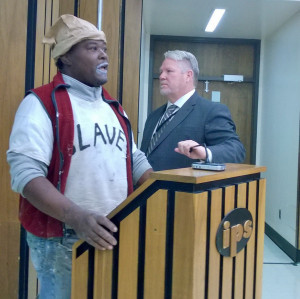I don’t know Larry Vaughn on a personal level, and I’m not inside his mind, so I don’t intend to speak for him. What I do intend to do, though, is check some rampant white privilege gone awry on facebook.
First of all, for those that do not know Larry, he is a political activist. He has probably been to almost as many IPS board meetings as I have in the past four years – and I’m sure his appearances there predate mine. He usually offers a delegation, a speech to the school board that is capped at three minutes. Larry typically wears a paper bag hat, a shirt with the word “slave” on it, and a ring of white makeup around his mouth.
Some school board members have begun to circulate pictures of Larry while at IPS, and made the following comments:

So, let me direct you to the definition of blackface:

Larry cannot be engaging in definition #1 above. Larry is a black man and therefore is not “a nonblack performer playing a black role”. I have listened to the same delegations that Larry has offered – seen IPS officials make him leave his signs outside the room, get his microphone cut off and kicked out of the board room – I have seen the same things as my fellow commissioners. What I see and hear though, beyond Larry’s superficial appearances, is a man trying to convey IPS’s role in the SECOND definition of blackface above – that IPS as an institution is insincerely and ineffectively nonracist, and patronizing to the black community – and therefore attempts have been made to silence him.
In my four years on the board, I can recall several instances in which IPS initiatives were viewed as racist. You can see those articles here – from the late Amos Brown on the move of school 70, the “soft bigotry of low expectations“, or the ousting of 706 Shortridge students to make way for Gambold students. Other journalists such as Stephanie Wang have more recently highlighted racial inequities within the district. My point here is that Larry Vaughn’s underlying message is not off base – nor was Amos’s or Stephanie’s. IPS needs to open itself up to that kind of critique if it is to progress forward.
What is really bothering me is the repeated attacks on this man’s character. I’ll be the first to admit that Larry has some unorthodox attention-grabbing theatrics to accompany his public political activist persona. He has made some equally attention-grabbing statements in the boardroom. However, it is not okay to impose white-centric views of what is deemed “appropriate” dress, appearance, and behavior onto others – and when they don’t conform to your norms – call them crazy:



Lisa Delpit, a well-known Education scholar defined a “culture of power” that serves to inhibit black people from speaking their truths on the education of Black youth. In her 1988 article The Silenced Dialogue: Power and Pedagogy in Educating Other People’s Children, Delpit explains five mechanisms of the culture of power. One is particularly poignant in Larry’s case:

So because Larry does not ascribe to the tenets of the white-centric culture of power, elected officials have taken to social media to attempt to further diminish him and call him crazy.
This is not intended to speak for Larry, because I know he is capable of doing that for himself. This is not an endorsement of Larry as a political candidate.
What this is: a defense of Larry’s personhood. His right to exist, think, and act OUTSIDE of the dominant ideology and norms inherent in the culture of power – without being ‘diagnosed’ and belittled for his differences. What this is, is a reminder of the fact that everyone has a democratic right to exercise free speech, even people we might disagree with. Kudos to Larry for persevering in the pursuit of his rights, and for his bravery in continuing to speak his unique truth in spaces where the culture of power would much rather render him silent.

My thoughts are my own, and do not represent those of any other entity, corporation, or group…and I stand with Larry in exercising my right to free speech! Questions or comments: gayle_cosby@yahoo.com

